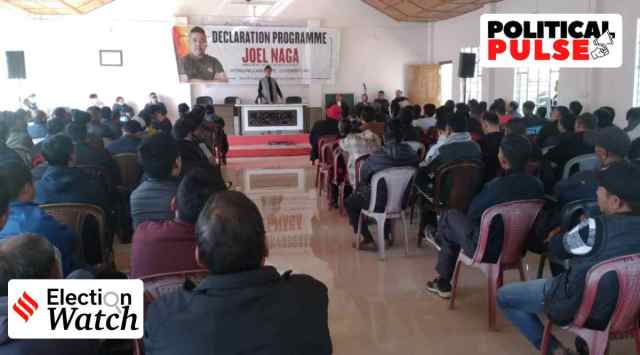Grappling with electoral politics, Nagaland’s newest party sticks by idealism as it pitches for system change
Making its debut in Nagaland Assembly polls by fielding just one candidate, Rising People’s Party still hopes to make a mark with its campaign against corruption, injustice and ‘misgovernance’
 Rising People’s Party (RPP)
Rising People’s Party (RPP) When the Rising People’s Party (RPP) was officially registered by the Election Commission (EC) two years ago, making it Nagaland’s newest political party, there was a heady buzz of idealism and expectation around it. The realities of the electoral politics has since tempered it. However, while making its debut in the 27 February Assembly polls by fielding just one candidate, the RPP still hopes to make a mark with its campaign against corruption, injustice and “misgovernance” in the state.
The 48-year-old RPP president, Joel Naga, who is contesting from the Tseminyu constituency, is one of the two prominent anti-corruption activists in the Nagaland fray this time, with Kahuto Chishi — the Gaon Bura of Hevishe village — being the other one. The convener of a forum called Concerned People of Nagaland, Kahuto, who writes regularly for the local newspapers, is contesting as an Independent candidate from the Dimapur-III seat.
In a state like Nagaland, where money and power drive elections, both Joel and Kahuto are popular faces but they are locked in tough contests in their respective constituencies against the candidates of the old, well-established parties.
“Corruption is a deep-rooted issue in Nagaland. The whole idea started as a kind of movement where some of us, around 15-16 people, got together and decided to form a social group called ‘The Naga Rising’. We formed it a couple of years ago and as we started to look at how we can play a role in bringing about change, the basic philosophy of how we can give a better future to our children,” said RPP member Khriezo Yhome.
“We soon realised that if you want to bring about radical change, there’s no way we can do it from outside. At some time, you will have to get into the system… It was with that understanding and vision that the party (RPP) was formed… The main issue being corruption, with a sharp focus on the youth and women,” Khriezo said.
The party captured public attention last year, when its members undertook a 980-kilometre ‘Walk to Save Nagaland’ across the state.
 Milling outside his home throughout the day are his supporters, many of them unemployed young men who say they are looking for a “different approach” to politics.
Milling outside his home throughout the day are his supporters, many of them unemployed young men who say they are looking for a “different approach” to politics.
At the end of the march, Joel had said that he had come to the conclusion that “there is no governance in Nagaland”, adding “The way we elect our leaders, if it doesn’t change, the system will not change. The ugly truth is this — we have taken money to vote in the elections. Don’t elect politicians anymore, elect leaders who love the people.”
Now, in his home in Kantinu village in Tseminyu just ahead of the polls, Joel says that the process of campaigning for elections has somewhat chipped away at the idealism in a different way. He says that when he goes to villages, people tell him that he is “no different from other politicians”. “Therefore, they say they want something from me. Since the government schools function so badly, people send their children to private schools in Tseminyu and need money for admissions. So they’ll tell me, ‘Can you solve my problem?’ When they come and ask me, I can’t deny them because they are genuinely in need so I give them 5,000 rupees. Because the Primary Health Centres are not functioning, people go to Kohima or Tseminyu for medical issues and they tell me they need help.”
Although he reasons he was not “buying votes”, Joel says, “When I give money, they are obliged to vote for me.”
Another sobering episode occurred when the limitations of contesting as a small party with limited resources became apparent ahead of the nomination process.
“When the election time approached, we did reach out to quite a few people who we thought shared our vision and ideology. Initially quite a good number were interested. But when the time came for ticket distribution, a couple of factors kicked in. One is that because so many parties from other states are participating this time, there was the presence of alternative parties willing to give them a ticket and support them. The other is that a lot of them were expecting some party funds for the elections, which we were not in a position to give as a new, small party with a difference,” said Khriezo.
Finally, the RPP decided to deploy all its wherewithal and energy for Joel’s electoral bid, who claims support from various quarters. “People know me and my track record. In 2016, I went to jail when I exposed a PDS scam. Because of my work in Against Corruption and Unabated Taxation, many businessmen have a soft corner for me… I think the youth are getting encouraged to support the party,” the RPP chief said.
 The party captured public attention last year, when its members undertook a 980-kilometre ‘Walk to Save Nagaland’ across the state.
The party captured public attention last year, when its members undertook a 980-kilometre ‘Walk to Save Nagaland’ across the state.
Milling outside his home throughout the day are his supporters, many of them unemployed young men who say they are looking for a “different approach” to politics. Among these is 32-year-old Senwo Along, who completed his BA from Patkai Christian College in 2015, took the NPSC exam for government jobs thrice without success, and is now attempting to start a business in second-hand motorcycles.
“A lot of times it feels like there are no options for young people here and no way to bring about any change because of the same cycle of powerful people being elected and disappearing for five years. Even in one seat if we can show that things can be different, it’s important,” Joel said.


- 01
- 02
- 03
- 04
- 05





























